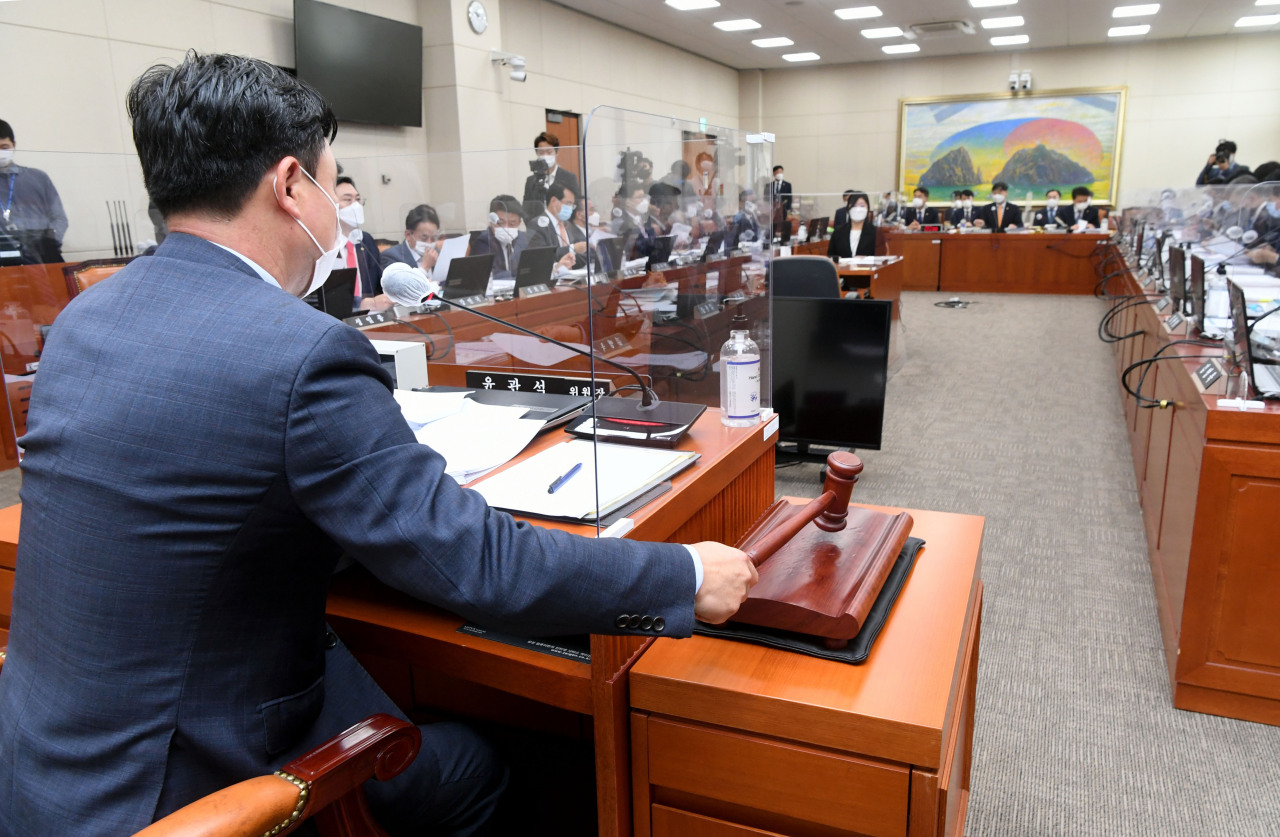 |
Rep. Youn Kwan-suk, lawmaker of the ruling Democratic Party of Korea and chairperson of the parliamentary National Policy Committee. (Yonhap) |
Tension is escalating at financial institutions as the National Assembly begins two weeks of auditing on financial bodies, focusing on a private equity fund scam and the government’s “Korean New Deal” program.
This year, the inspected organizations are especially weighed down by advance paperwork, as only a limited number of people are allowed in the audit hall, as par of anti-coronavirus social distancing rules.
The National Policy Committee of the National Assembly will inspect finance-related public organizations, starting with the regulator Financial Services Commission on Monday and the market watchdog Financial Supervisory Service the following day.
On Friday, state-run financial institutions such as Korea Development Bank, Industrial Bank of Korea, Korea Credit Guarantee Fund, and Korea Inclusive Finance Agency will undergo inspection, followed by Korea Deposit Insurance Corp., Korea Asset Management Corp., Housing Finance Corp., Korea Securities Depository on Sept. 20.
Wrapping up the two-week schedule will be the comprehensive inspection on the FSC and FSS on Oct. 23.
Unlike the FSC, which is a government department under the Prime Minister’s Office, the FSS is currently a private special-purpose corporation supervised by the FSC’s advisory panel Securities and Futures Commission. But considering its market watchdog function and based on the Act on the Inspection and Investigation of State Administration, the FSS is subject to state audits.
The key issue that is likely to take spotlight is the prolonged fiasco over the mis-selling of poorly managed private equity funds -- which led to investor losses worth more than 5 trillion won ($4.3 billion) so far.
Attending the audit as key witness will be NH Investment & Securities CEO Jeong Young-chae, Daishin Securities CEO Oh Ik-keun, Hana Bank Vice President Park Sung-ho, other officials of domestic financial companies that served as trustees in the fund sales, as well as investor representatives.
Rekindling the private equity fund scam in recent months was a series of internal reports that allegedly linked high-profile politicians to the Optimus Asset Management’s mis-selling case.
Whereas opposition lawmakers are largely expected to stick to the power-rigging allegation and blame financial authorities for dereliction of supervisory duty, the ruling party is likely to press hard on financial companies.
Another agenda is the New Deal Policy Fund, a 20 trillion-won program aimed at funneling money into 5G, artificial intelligence, smart health care, renewable energy, robot technology and hydrogen vehicles, in line with the Moon Jae-in administration’s mid-term fiscal stimulus package – the so-called Korean New Deal.
The corresponding fund will comprise 3 trillion won in government investment, 4 trillion won in investment from state-run financial institutions and 13 trillion won from private financial firms and the public.
As the fund added further to the government’s already record-level fiscal spending to deal with the COVID-19 fallout, concerns had been rampant that it could fall short of expectations, like other state-led policy funds in the past. Meanwhile, working-level officials are under growing pressure to prepare an impeccable set of reference documents beforehand, due to the ongoing social distancing rule that restricts the number of people attending each audit to 50 per room.
Conventionally, accompanying officials could deliver quick fact sheets and notes to their chiefs on during audit sessions, in case of abrupt questions or fact inquiries.
By Bae Hyun-jung (
tellme@heraldcorp.com)








![[Herald Interview] How Gopizza got big in India](http://res.heraldm.com/phpwas/restmb_idxmake.php?idx=644&simg=/content/image/2024/11/20/20241120050057_0.jpg)